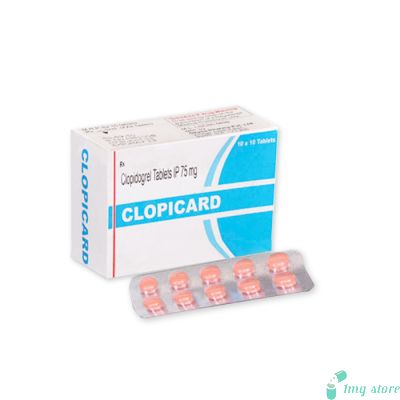Plavix Tablet (Clopidogrel)
Plavix Tablet (Clopidogrel) is a medication used to prevent the formation of blood clots (thrombi) in hardened blood vessels (arteries). This process, known as atherothrombosis, can result in serious events like stroke, heart attack, or even death. Clopidogrel is prescribed to reduce the risk of these atherothrombotic complications.
Information of Plavix Tablet (Clopidogrel 75mg)
Clopidogrel, commonly known by its brand name Plavix, is a medication used to prevent blood clots in individuals with certain cardiovascular conditions. It belongs to a class of drugs called antiplatelets, which work by inhibiting platelet aggregation and reducing the risk of clot formation. Clopidogrel tablets are commonly available at a strength of 75mg. This dosage is typically prescribed by healthcare professionals based on the individual's specific condition and medical history. It is essential to follow the prescribed dosage and any instructions provided by your healthcare provider for optimal results and safety. Remember, it is always recommended to consult with a healthcare professional before starting or changing any medication regimen, including Clopidogrel. They will assess your medical history, evaluate potential interactions or contraindications, and provide personalized guidance to ensure the best possible outcome for your health.
Clopidogrel, commonly known as Plavix, is a medication frequently prescribed to individuals with Heart and Blood Pressure conditions. It is an antiplatelet drug that helps prevent blood clot formation, reducing the risk of heart attacks, strokes, and other cardiovascular events.
The recommended dosage of Clopidogrel is typically 75mg per day. This dosage has been shown to effectively inhibit platelet aggregation, making it an essential component of the treatment plan for individuals with heart conditions. By preventing Blood Clots from forming, Clopidogrel helps maintain healthy blood flow through the arteries, reducing the likelihood of blockages that can lead to heart attacks or strokes.
The benefits of Clopidogrel extend beyond its antiplatelet properties. For individuals with high blood pressure, Clopidogrel can help maintain proper blood circulation and prevent complications that may arise from elevated blood pressure levels. By reducing the risk of blood clots, it contributes to overall cardiovascular health, particularly in individuals with existing heart conditions or hypertension.
It is important to note that Clopidogrel should only be taken under the guidance and prescription of a healthcare professional. They will evaluate your specific medical condition, take into account other medications you may be taking, and determine the appropriate dosage for you. Regular monitoring and follow-up with your healthcare provider are crucial to ensure the medication's effectiveness and address any potential side effects or interactions that may occur.
Purchase Clopidogrel online: At 1mgstore.com, you can find low-cost Clopidogrel tablets, making it a cost-effective option for those in need of this medication. This online platform offers the convenience of purchasing Clopidogrel online, allowing individuals to order their prescribed dosage from the comfort of their own homes. The availability of Clopidogrel online makes it easier for patients to maintain their medication regimen, ensuring they have a continuous supply of Plavix. This convenient online purchase of the Plavix option eliminates the need for physical visits to pharmacies and provides a hassle-free experience.
Remember, Clopidogrel is not a substitute for a comprehensive treatment plan for heart conditions or high blood pressure. It should be used in conjunction with other lifestyle modifications, such as a heart-healthy diet, regular exercise, and adherence to prescribed blood pressure medications, to achieve optimal cardiovascular health. Always consult with your healthcare provider for personalized advice and guidance regarding your specific medical needs.
Here are a few safeguards to consider while taking Clopidogrel:
- Always consult with your healthcare provider before starting or stopping Clopidogrel. They will assess your medical history, evaluate potential interactions or contraindications, and provide personalized guidance.
- Inform about allergies or bleeding disorders: Inform your healthcare provider about any known allergies to medications, including Clopidogrel (Plavix), or if you have a history of bleeding disorders.
- Inform your surgeon or dentist about your Clopidogrel usage before any planned surgical procedures or dental work. They may provide guidance on whether to continue or temporarily stop the medication prior to the procedure.
- Clopidogrel increases the risk of bleeding, so it is important to take precautions. Avoid activities that may result in injury or excessive bleeding. If you experience any unusual bleeding or bruising, notify your healthcare provider immediately.
- Some NSAIDs, such as ibuprofen or naproxen, can increase the risk of bleeding when combined with Clopidogrel. Consult your healthcare provider before taking any NSAIDs while on Clopidogrel.
- Ensure that all healthcare providers, including doctors, dentists, and pharmacists, are aware of your Clopidogrel usage. This information is important to ensure safe and effective medical care.
- If you are pregnant, planning to become pregnant, or breastfeeding, discuss the risks and benefits of using Clopidogrel with your healthcare provider. They will determine whether the benefits outweigh any potential risks.
- Follow up with your healthcare provider for regular check-ups and monitoring. They may perform blood tests to assess your response to Clopidogrel and adjust the treatment plan as needed.
Clopidogrel, usually known as Plavix, is utilized for the accompanying purposes:
Prevention of blood clots: Clopidogrel is primarily prescribed to prevent blood clots in individuals with cardiovascular conditions such as a history of heart attacks, strokes, or peripheral artery disease. It helps reduce the risk of clot formation, which can lead to severe complications.
Reduction of heart attack risk: Clopidogrel is used to lower the chances of having another heart attack in individuals who have previously experienced one. It helps maintain healthy blood flow through the arteries and minimizes the risk of blockages.
Prevention of stroke: Clopidogrel is prescribed to reduce the risk of stroke in individuals who have had an ischemic stroke or a transient ischemic attack (TIA), also known as a mini-stroke. By preventing blood clots, it helps maintain proper blood circulation to the brain.
Management of certain heart conditions: Clopidogrel is used as part of the treatment plan for specific heart conditions, such as unstable angina or acute coronary syndrome. It helps stabilize the condition and prevent further complications.
Here are a few normal incidental effects related to Clopidogrel:
Bleeding: One of the most significant side effects of Clopidogrel is an increased risk of bleeding. This can manifest as easy bruising, nosebleeds, prolonged bleeding from cuts, or gastrointestinal bleeding. It is important to seek medical attention if any unusual bleeding occurs.
Upset stomach: Some individuals may experience gastrointestinal side effects such as stomach pain, indigestion, diarrhea, or nausea while taking Clopidogrel. These symptoms are usually mild and transient.
Headache: Headaches can occur as a side effect of Clopidogrel (Plavix). In most cases, the headaches are mild and go away on their own. However, if headaches persist or worsen, it is advisable to consult a healthcare professional.
Skin reactions: Rarely, individuals may experience skin reactions such as rash or itching while taking Clopidogrel. If any unusual skin symptoms occur, it is recommended to seek medical advice.
Dizziness: Some individuals may experience dizziness or lightheadedness while taking Clopidogrel. It is important to be cautious when performing tasks that require alertness, such as driving or operating machinery until the dizziness subsides.
Fatigue: Fatigue or feeling tired can occur as a side effect of Clopidogrel. If this symptom persists or becomes bothersome, consulting a healthcare provider is recommended.
Muscle aches: In rare cases, individuals may experience muscle aches or joint pain while taking Clopidogrel. If these symptoms are severe or persistent, medical advice should be sought.
Concern About Plavix Tablet (Clopidogrel)
Can I stop taking Clopidogrel without consulting my healthcare provider?
Answer: No, it is essential to consult your healthcare provider before stopping Clopidogrel. Suddenly discontinuing the medication can increase the risk of blood clot formation, which may lead to serious cardiovascular complications. Your healthcare provider will guide you on when it is safe to discontinue or adjust the dosage.
Are there any dietary restrictions while taking Clopidogrel (Plavix)?
Answer: There are no specific dietary restrictions associated with Clopidogrel (Plavix). However, maintaining a heart-healthy diet, low in saturated fats and high in fruits, vegetables, and whole grains, is generally recommended to support overall cardiovascular health.
Can I drink alcohol while taking Clopidogrel?
Answer: Moderate alcohol consumption is generally considered acceptable while taking Clopidogrel. However, excessive alcohol intake can increase the risk of bleeding and interfere with the effectiveness of the medication. It is advisable to consult your healthcare provider regarding alcohol consumption based on your specific health condition.
Can I take over-the-counter pain medications like acetaminophen (paracetamol) while on Clopidogrel?
Answer: Acetaminophen is generally considered safe to use for pain relief while taking Clopidogrel. However, it is important to consult your healthcare provider or pharmacist before using any over-the-counter medications to ensure they do not interact with Clopidogrel or increase the risk of bleeding.
Can Clopidogrel interact with herbal supplements?
Answer: Yes, herbal supplements can potentially interact with Clopidogrel. Some herbal supplements, such as ginkgo biloba, garlic, and ginger, may increase the risk of bleeding when combined with Clopidogrel. It is important to inform your healthcare provider about any herbal supplements you are taking to ensure their compatibility with Clopidogrel and avoid any potential interactions.
Here are some significant medication associations to know about while taking Clopidogrel:
Nonsteroidal anti-inflammatory drugs (NSAIDs): NSAIDs like ibuprofen and naproxen can increase the risk of bleeding when combined with Clopidogrel. Consult your healthcare provider before using NSAIDs while taking Clopidogrel.
Anticoagulants: Combining Clopidogrel with anticoagulant medications, such as warfarin or heparin, may increase the risk of bleeding. Your healthcare provider will closely monitor your condition and adjust the dosages of these medications if necessary.
Proton pump inhibitors (PPIs): Some PPIs, such as omeprazole or esomeprazole, used for treating acid reflux or ulcers, may reduce the effectiveness of Clopidogrel. Discuss alternative medications or dosages with your healthcare provider if PPI usage is necessary.
SSRI and SNRI antidepressants: Certain selective serotonin reuptake inhibitors (SSRIs) and serotonin-norepinephrine reuptake inhibitors (SNRIs), like fluoxetine or venlafaxine, may increase the risk of bleeding when combined with Clopidogrel. Close monitoring by your healthcare provider is essential.
Cilostazol and ticlopidine: Co-administration of Clopidogrel (Plavix) with cilostazol or ticlopidine may increase the risk of bleeding. Your healthcare provider will assess the potential benefits and risks before prescribing these medications together.
Other antiplatelet drugs: Taking multiple antiplatelet drugs together, such as aspirin or dipyridamole, may increase the risk of bleeding. Your healthcare provider will determine the appropriate combination and dosage based on your specific condition.
Heparin and low molecular weight heparin: Concurrent use of Clopidogrel with heparin or low molecular weight heparin may increase the risk of bleeding. Close monitoring and dosage adjustments are necessary under the supervision of your healthcare provider.
Herbal supplements: Inform your healthcare provider about any herbal supplements you are taking, as some may interact with Clopidogrel and affect its effectiveness or increase the risk of bleeding.
| Manufacturer | : | Sanofi Aventis, India |
| Equivalent Brand | : | Plavix |
| Generic Search | : | Clopidogrel |


















